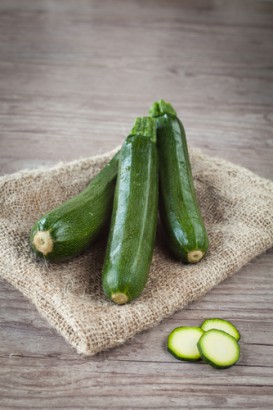A special diet for a flat stomach
mis à jour le 4 May 2019 à 10:29If there is one moment we dream about not having a tummy, it is definitely when at the beach, all suited up in our Lycra. And that moment is coming soon, what with summer just around the corner! What foods should we adopt, and how should we eat them to avoid bulking up? Nutritionist Jean-Michel Cohen shares with us his advice.

Which foods should we choose?
Vegetables:
To choose: Zucchini and eggplant, which are very easily digestible. Baby corn. Fennel, after removing the hardest outer leaves. Green salad. Tomatoes, provided the skin and seeds (which cause acidity) are removed. Cucumbers, stripped of their soft centres. “To aid digestion, I recommend chewing on spices such as coriander or caraway seeds after a meal,” says Virginia Roux, dietician at the l’Agence des fruits et legumes (Fruit and Vegetable agency in France).
To lose: Vegetables with harsh and irritating fibres such as radish, cabbage (white or red) and the green parts of leeks. Ditto for peppers; the skins and seeds are too hard to digest, and peas, because they contain enzymes that make the stomach bloat.
Fruit:
To choose: Raspberries and strawberries. Nectarines, peaches, pears, apples, washed and dried. And apricots, for those who are able to digest the skin without problem.
To lose: Fruits with high water content or served very fresh, such as melon (95% water) and watermelon. And if you cannot avoid it, limit yourself to a maximum of two slices, unaccompanied by a glass of water, because this results in serious bloating. Cherries and plums, rich in sorbitol, are also the best allies to swollen tummies. Flee from grapes and figs as well, due to the large number of seeds they contain.
Meat and fish:
Opt for fish over meat, whilst avoiding the more fatty varieties (eg. tuna, sardine, salmon, mackerel). Minced or thinly sliced meat is less compact, and therefore more digestible. White meat (eg. veal, turkey or chicken) it is also easier to digest because of the lower fat content.
Milk and cheese:
Fats are found in relatively low quantities in milk, even when full-cream. “There is therefore no reason to deprive yourself of it,” says Jean-Michel Cohen. If you cannot get over your soft spot for cheeses, just remember to avoid those containing mould (Roquefort, blue, Gorgonzola...), as they amplify the phenomenon of fermentation (and therefore bloating) in the stomach.
How to prepare them:
Avoid cooking fats:
They form a chemical called propanol that irritates the intestinal wall and promotes bloating. Meat or vegetables should be boiled, roasted, grilled or cooked in a microwave. Oil or butter should be added only off the heat.
Chop and cook vegetables:
Raw vegetables may be tempting, but they can cause pain and bloating. So avoid those which are the richest in fibre. In all cases, it is better finely chop, boil, or even puree the vegetables. The broken down fibres thus lose their irritancy. For starters and salads, vegetables like green beans, carrots, asparagus, leeks, mushrooms should be blanched – first cooked, then served cold.
Peel and de-seed fruits:
“Rich in pectin, their skin is less easy to digest. You may even find traces of chemical treatments that can irritate the intestinal cells,” says Dr. Cohen. The seeds are made of vegetable fibres; they are thus not absorbed by the intestine, although they have been mashed by the teeth. Fruits can be replaced by industrial compotes and fruit syrups. Forget jams, as they are mostly made from whole fruit, including the seeds. Opt instead for jellies.
Toast your breads:
The lighter the bread, the more air it contains... which, once swallowed, results in the stomach bulging. The more it is cooked (or toasted), the more the starch fibres tighten – the air then disappears, and digestion becomes easier. Avoid, therefore, fresh breads, especially those just out of the oven, which are still cooking, and whose starch is still not sufficiently broken down. As for wholemeal breads or cereals, the large amount of fibres makes them difficult to digest.
The false friends:
Soft drinks and fruit juices:
Carbonated or fizzy drinks contain air and carbon dioxide to create the bubbles. Once swallowed, these gases make the stomach inflate. Alcohol, irritating by nature, should also be limited. Alcoholic and gaseous, rich in enzymes and sugar, beer, specifically, is the worst enemy of your bikini body. The pulp in fruit juices can be problematic as well. It is better to replace them with flavoured waters.
Diet chewing gums:
The repeated and prolonged mastication makes you swallow air and inflate the stomach. Moreover, sorbitol and xylitol, which “sweeten” chewing gums, are just as irritating to the intestines as alcohol is.
* Author of “Maigrir, le grand mensonge” (Weight Loss, the big lie) (Flammarion).
Mathieu Rached
To continue reading the report “Getting ready for swimsuit season”:
How to feel self-confident in a swimsuit?



